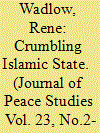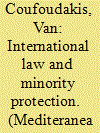| Srl | Item |
| 1 |
ID:
151163


|
|
|
| 2 |
ID:
085299


|
|
|
|
|
| Publication |
2008.
|
| Summary/Abstract |
In this essay a largely forgotten human rights issue involving the fate of the Greek-in-origin population that inhabited the Turkish islands of Imbros and Tenedos is examined. Exempted from the Greek-Turkish population-exchange agreements concluded following the end of World War I, the Greek population of the two islands was granted specific civic, cultural, and religious rights by the 1923 Treaty of Lausanne. The treaty remains valid to this day. Turkey deliberately violated the rights of this population because of its ethnicity, religion, and language. The author analyzes the methods used by Turkey to ethnically cleanse the two islands and the options available to the former residents of these islands as well as to the governments of Greece and Turkey to resolve the documented violations of the Treaty of Lausanne and of the European Convention on Human Rights.
|
|
|
|
|
|
|
|
|
|
|
|
|
|
|
|
| 3 |
ID:
093091


|
|
|
|
|
| Publication |
2009.
|
| Summary/Abstract |
Scholars and policymakers have turned increasing attention to questions of transitional justice, those legal responses to a former regime's repressive acts following a change in political systems. Although there is a rich, interdisciplinary literature that addresses the value of various transitional justice measures, theoretical arguments for how and under what conditions we should expect to see these measures implemented tend to gravitate to intuitively appealing relative power considerations. But attempts at parsimony have tended to leave the dependent variable either overly restrictive or poorly defined, yielding theories that are difficult to test. In this article, the author proposes a 'transitional justice spectrum' based on a hierarchical series of possible accountability mechanisms and designed to allow researchers to conduct more rigorous, cross-national tests of justice arguments. The objective here is not to posit a broad theory of transitional justice, but to open the debate into a methodological weakness in the transitional justice literature. The article includes seven accountability mechanisms: cessation and codification of human rights violations; condemnation of the old system; rehabilitation and compensation for victims; creation of a truth commission; purging human rights abusers from public function; criminal prosecution of 'executors' (those lower on the chain-of-command); criminal prosecution of commanders (those higher on the chain-of-command).
|
|
|
|
|
|
|
|
|
|
|
|
|
|
|
|
| 4 |
ID:
150051


|
|
|
|
|
| Summary/Abstract |
Regulatory inspection and violation reports provide insight into the impact of natural gas extraction on the surrounding environment, human health, and public safety. Inspection reports for natural gas wells in Pennsylvania were collected from the Pennsylvania DEP Compliance Report from 2000 to 2014. Analysis of 215,444 inspection records for 70,043 conventional and unconventional wells was conducted in order to compare the odds of violations occurring under different circumstances. Logistic regression models were used to estimate the probability of violations occurring for both conventional and unconventional wells. When inspected, conventional wells had 40% higher odds of having a violation. However, unconventional wells had higher odds for environmental violations related to waste discharge as well as cementing and casing failures. Large operators had 40% lower odds of having any violation than smaller operators. While larger operators had fewer violations, a few of the largest companies had rates of violation much higher than the average for all operators, with some reaching violation rates as high as 1 in 4 active wells. A well also has a higher chance of being in violation if it is in the first year (85%) or second year (109%) since its spud date.
|
|
|
|
|
|
|
|
|
|
|
|
|
|
|
|